Cardiff ‘modern slavery' victim ‘emotionally broken’
- Published
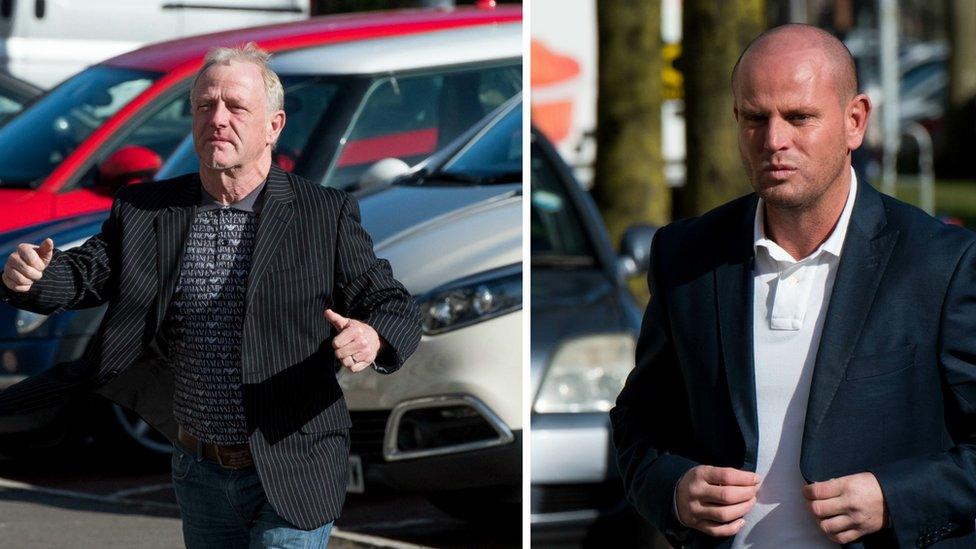
Patrick Joseph Connors and son Patrick Dean Connors outside Cardiff Crown Court
Michael Hughes moved to Wales in 1988 in search of a better life.
Instead he found himself "bought", confined to a garden shed and forced into hard labour for a staggering two decades as a modern slave.
A jury has now found he fell prey to members of the Connors family in south Wales, who regularly beat him and "hunted" him down when he escaped.
But what toll do years of such ill-treatment take on a victim?
BBC Wales spoke to Gwent Police to find out.

"It was quite horrific what he had to go through," said Ch Supt Paul Griffiths.
"The victim suffered considerably through some of the intimidation, threats and violence - but he was emotionally broken and that's what gave the criminals the controlling factor over him."
In 2013, the force launched Operation Imperial - an investigation into "modern slavery" and trafficking offences within the travelling community between Newport and Cardiff.
Ultimately, that led to the conviction of Patrick Joseph Connors, 59, and his relatives, Patrick Dean Connors, 39, and William Connors, 36 - all of Rumney - of requiring another person to perform forced or compulsory labour, on Tuesday.
Patrick Joseph Connors' son-in-law Lee Carbis, 34, of Trowbridge, was cleared of forced labour but found guilty of kidnap. The four were jailed for between two-and-a-half and 14 years.
Mr Hughes lived in "appalling conditions" in a shed, a garage and a tin hut, with no access to heating or water, Cardiff Crown Court heard during the trial.
"It's incredible," said Ch Supt Griffiths. "They [the criminals] just use the victims as commodities. Their sole purpose is to make money.
"They have got total disregard for humanity."
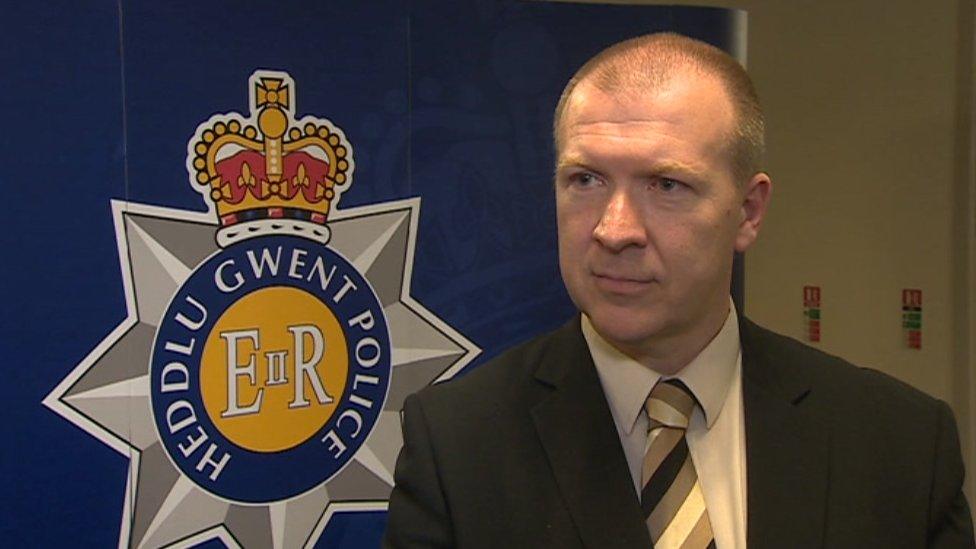
Ch Supt Paul Griffiths says there could be scores more victims of 'modern slavery' in Wales
Mr Hughes was made to graft for Patrick Joseph Connors' tarmacking and building firm, working punishing hours in return for less than £10 a day or for just tobacco and alcohol.
But how are victims like him lured into a life of ruthlessly-enforced servitude?
"They are extremely cunning - the criminals, in terms of trying to locate the areas where these people [potential victims] congregate," Ch Supt Griffiths explained.
"What we found is that criminals from the travelling community hone in on trying to identify these individuals and draw them into an environment in which they actually find themselves trapped.
"[This victim] was in need of work and found himself in a situation where he was offered food, accommodation and work for payment.
"That started a journey with the criminals, which was quite ruinous to his life."
Aberdeen-born Mr Hughes, who was taken into care as a toddler, moved to Wales more than a quarter of a century ago in search of a fresh start.
But after a brief stint doing building work, his services were acquired by a family in the Marshfield area before he was "bought" by the Connors, Cardiff Crown Court heard.
He was made to live in a 1.2m (4ft)-wide garden shed with no heating or running water for two years.
Ordered to work long hours - even when he had a broken leg - he would suffer frequent beatings.
The only respite came when Mr Hughes was sent back to Scotland for unpaid fines and jailed. He said prison was "like a holiday camp" compared to his ordeal in Wales.

'It was horrible'
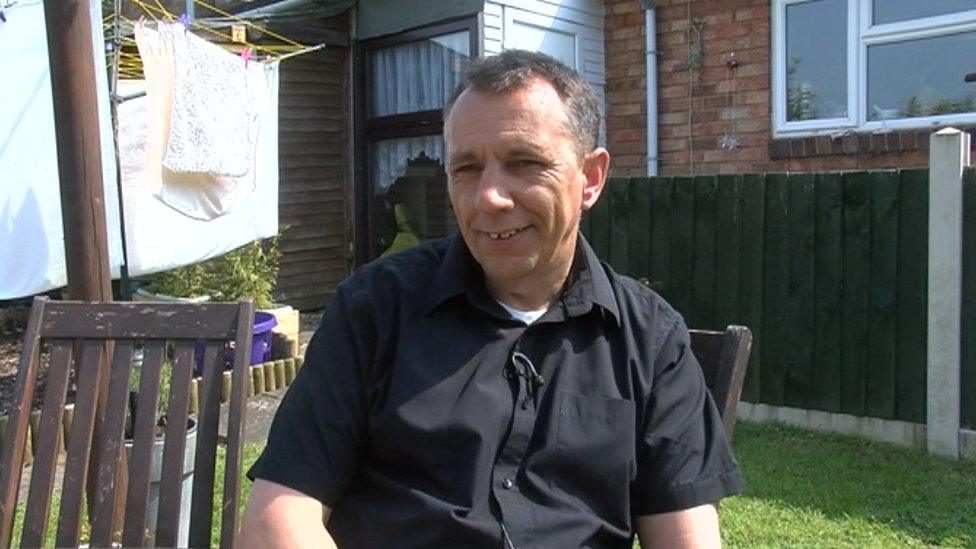
The case involving victim Darrell Simester, now 45, lifted the lid on modern slavery in Wales.
Mr Simester was made to work for up to 16 hours a day at Cariad Farm in Peterstone, near Newport, for 13 years.
His family, from Kidderminster, Worcestershire, believed he had gone missing after a trip to the seaside in Porthcawl, Bridgend, in 2000.
In fact, he had fallen victim to David Daniel Doran, who was jailed for four-and-a-half years in October 2014 for making Mr Simester perform forced or compulsory labour.
Mr Simester told the Wales Today programme last week: "It was terrible. It was just a mess, really... and horrible."
He said he had been "just too scared" to escape those who had forced him to work.
However, he had this advice for anyone who found themselves propositioned: "If someone stops you on the road and asks you to work for them, just say no, you're not interested and just walk off."
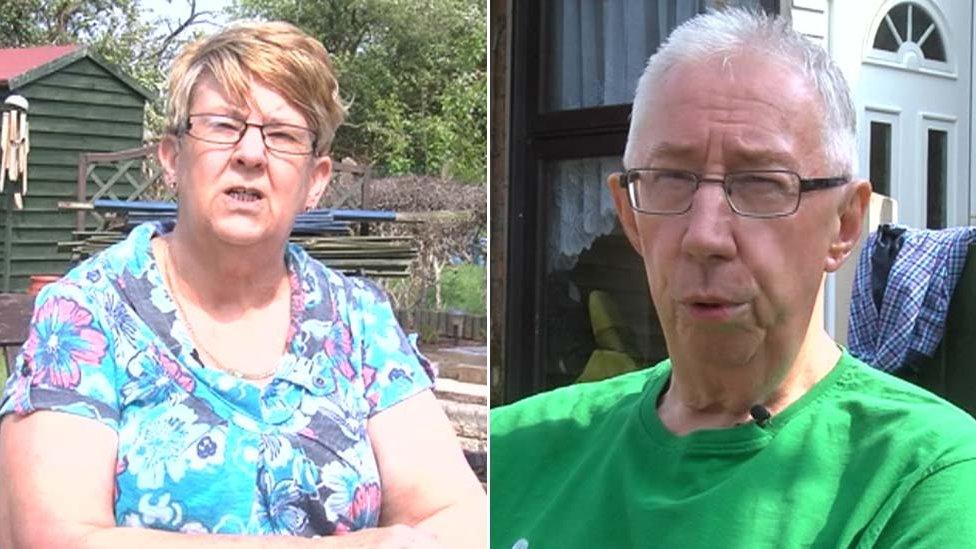
Darrell Simester's parents Jean and Tony believe more could be done to prevent forced labour
His mother Jean, 65, said he was now "improving a lot" , having rebuilt his life after the ordeal.
She said: "We want more of these people sent to court and sent down for what they are doing to innocent people. We have got to get awareness of slavery in this day and age.
"It is there, people are being held against their will and being worked for little or nothing".

On his release from custody, Mr Hughes was forced to return to south Wales by Patrick Joseph Connors.
He made several escape attempts and it was only after watching a TV news report about forced labour that Mr Hughes finally broke free. He was then traced by Gwent Police in December 2013.
After his arrest, Connors senior insisted he had dealt fairly with both victims, saying he had treated Mr Hughes "like a member of the family".
But jurors did not believe his story and convicted him.
The gang was also convicted of some kidnap and assault charges relating to a second, unnamed man.
After the verdicts, Mr Hughes said he was "over the moon" and "happy" to have his life back.
"With the help and support of my family, I am now re-building my life. I am getting out and about and meeting new people. I also have a job, which is helping me make new friendships," he said.

Lee Carbis was cleared of forced labour but found guilty of kidnap
Ch Supt Griffiths said much of modern-slavery offences rested on the targeting of "vulnerable" people.
"That vulnerability is sometimes seen through addictions, through drink or drugs, through mental health issues, social exclusion, homelessness or just that general need in life."
Some people may even be unaware they have been victimised - with the number of those swallowed by the trade still unknown.
Academics suggest there are 10,000 to 13,000 victims of modern slavery in the UK, with police figures showing an increase in the number of victims.
"There are clearly more victims," said Ch Supt Griffiths. "We identify individuals who we try and trace to check on their welfare and safeguarding.
"There have been people we have sadly been unable to locate and it's certainly something we're considering beyond this court case.
"What we say to the victims is what they are experiencing is a horrific crime.
"We care and we are there to try and support them in escaping this kind of environment. Please pick up the phone and contact us."

The verdicts
Patrick Joseph Connors, of Rumney, Cardiff: Guilty of requiring another person to perform forced or compulsory labour between 2010 and 2013, eight counts of ABH, four of kidnap and one of conspiracy to kidnap - jailed for 14 years
Patrick Dean Connors, of Rumney: Guilty of requiring another person to perform forced or compulsory labour between 2010 and 2013 and kidnap, not guilty of conspiracy to kidnap - jailed for six-and-a-half years
William Connors, of Rumney: Guilty of requiring another person to perform forced or compulsory labour between 2010 and 2013, not guilty of assault - jailed for four years
Lee Carbis, of Trowbridge: Guilty of kidnap, not guilty of requiring another person to perform forced or compulsory labour between 2010 and 2013 - jailed for two-and-a-half years
- Published24 May 2016
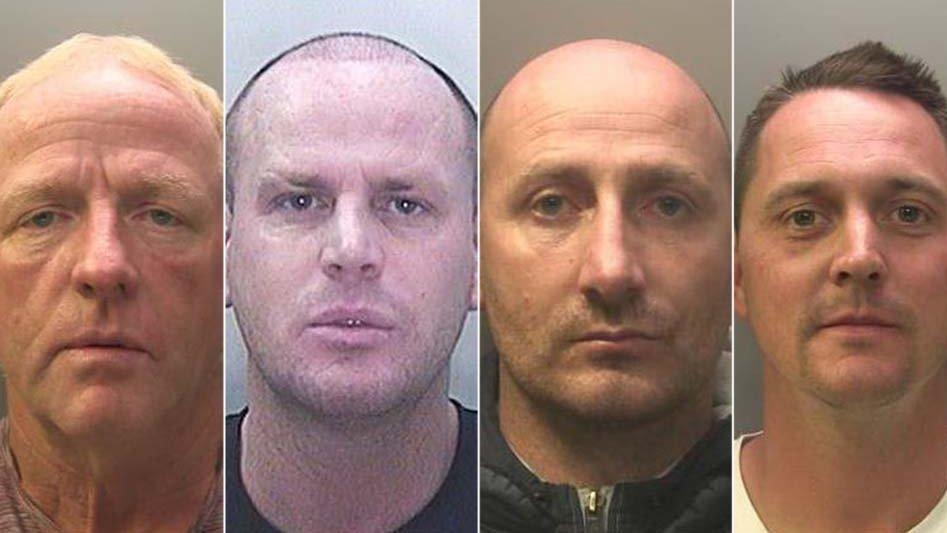
- Published17 May 2016
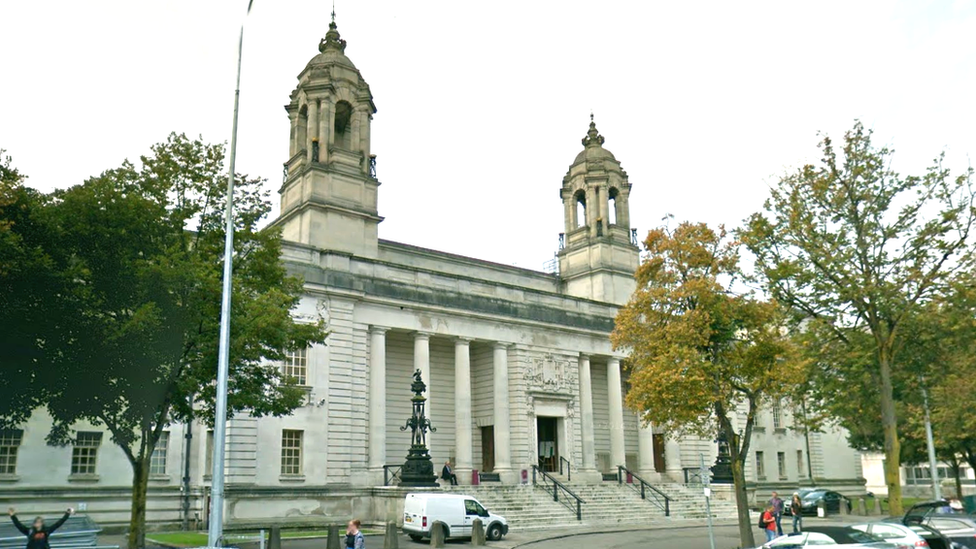
- Published16 October 2015
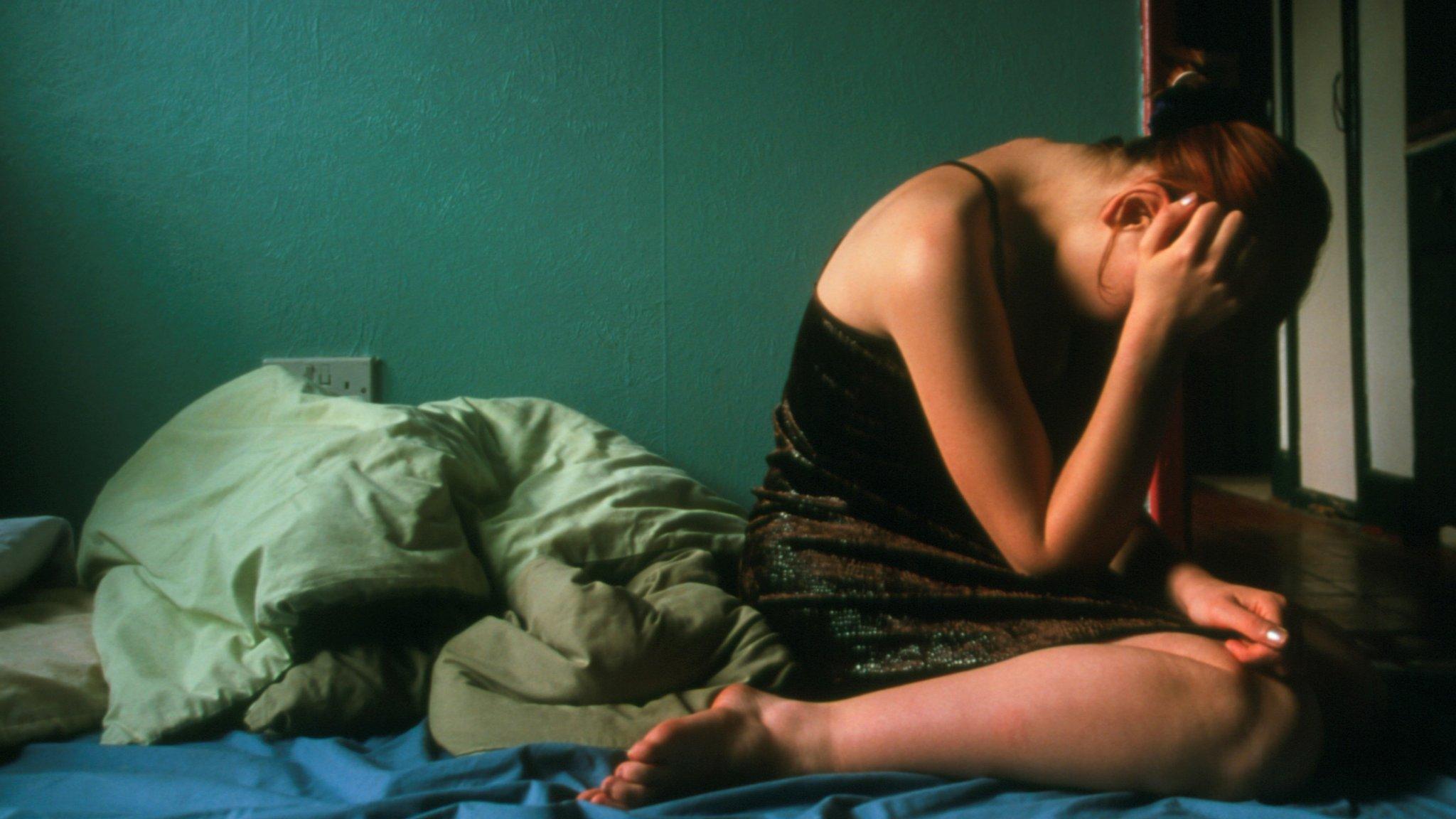
- Published20 April 2016

- Published28 April 2016

- Published19 April 2016

- Published4 November 2014
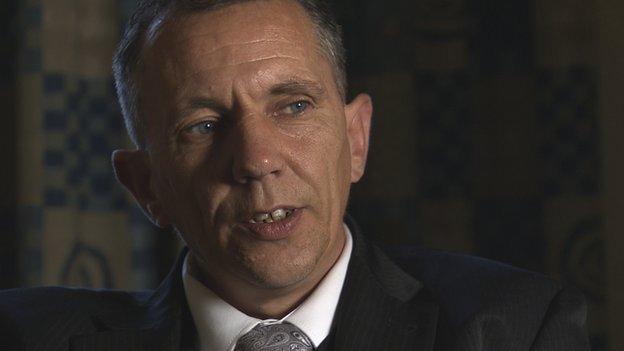
- Published9 May 2016
